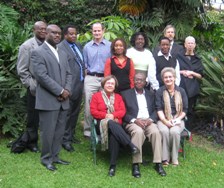|
OER Africa is an initative of SAIDE which aims to play a leading
role in driving the development and use of Open Educational Resources
(OER) on the African continent. The OER Africa Advisory Committee
meeting was held in Nairobi, Kenya in May 2009. These meetings provide
strategic guidance and support to the OER Africa management team
that is driving the OER Africa project. Apart from reviewing progress
made so far during the planning phase of OER Africa, the meeting
discussed how best the project can move forward in the next phase
of the initiative, the implementation phase. Ephraim Mhlanga, the
meeting rapporteur provides an abridged version of his final report.
Project achievements
The deliberations of the Nairobi meeting centred on the achievements
of the OER Africa initiative to date and how it should proceed as
it moves into the implementation phase. In addition to the comprehensive
documentation that was provided by the OER Africa management team,
eloquent presentations were also made by Catherine Ngugi and Neil
Butcher on how the project had fared so far, and the challenges
that had been encountered. In the planning phase of the project,
extensive work had reportedly been done in the following six areas
of the project:
- Planning the project and setting up appropriate systems and
structures.
- Conducting research to facilitate thorough understanding of
the needs, problems, challenges and opportunities of African universities.
- Conducting research to understand OER within the African context,
and their potential for addressing some of the problems faced
by universities on the continent.
- Forging strategic partnerships with different organisations.
- Building communities of practice.
- Developing an OER Africa website.
These areas formed the basis for the discussions on the first day
of the meeting. The meeting commended the OER Africa team for the
progress made in all the six areas itemised above.
- In particular the members were happy to note that the research
dimension of the project had meaningfully informed the planning
processes of the project.
- The challenges facing the African university were clearly articulated
in the documentation provided.
- Strides had been made in forging relationships with umbrella
bodies like African Council for Distance Education (ACDE) and
individual institutions such as the Open University of Tanzania,
National Open University of Nigeria and University of Michigan.
- The OER Africa website had been set up and already, it hosted
four communities of practice - Skills for a Changing World, ACE
Maths, Health OER, and the Food Security Facilitator’s Programme.
Meeting discussions on the second day focused primarily on how
the project should proceed, and members gave suggestions and recommendations
on the subject. To view a summary of the recommendations click
here.
Challenges
There are inevitable challenges that OER Africa stands to face as
it moves towards the implementation phase. One of these challenges
is to demonstrate the cost-effectiveness of OER in order to maximize
institutional buy-in. One way of doing this is by developing models
of sustainability in so far as the collaborative creation and use
of OER is concerned. It will be important to convince institutions
that OER Africa can enable institutions to alleviate some of the
pressing problems they face in achieving their academic mission,
and might in fact not achieve the same objectives without resorting
to OER.
An important aspect of the project to consider is its long-term
sustainability. OER Africa needs to have several income streams.
As was suggested at the first Advisory Committee meeting, amongst
other options, a paid consultancy model may have to be considered.
Conclusion
OER Africa has so far provided important lessons to those who have
been actively involved in its planning, from an administrative as
well as from an implementation point of view. It has also provided
an opportunity to appreciate some of the possible hurdles that have
to be overcome if institutions are to fully embrace OER. Working
at a distance from each other, OER Africa project staff have nonetheless
managed to nurture and build real partnerships, conduct and discuss
tangible research outputs, build and populate a website and form
themselves into a cohesive team. Certainly this is a good start
for the project and the challenge is to build on this foundation
and demonstrate that the merits of creating, adapting, and using
OER in collaborative ways are obvious.
| 
